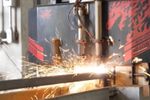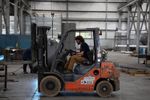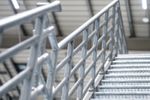Working with feed and grain is messy and hazardous. One of the most serious threats to agricultural workers is an explosion from combustible fine particles of grain dust. More than 3,500 dust explosions have occurred over the past 30 years and these incidents increased in 2019, according to the recently-released annual report from Purdue University’s Department of Agricultural and Biological Engineering.
Explosions are just the tip of the iceberg when it comes to safety hazards from transporting feed and grain or performing maintenance tasks inside silos or tanks. Fortunately, custom metal fabrication can reduce these risks. Custom engineered silos and bins with proper ventilation and access points can dramatically mitigate these hazards and safeguard agricultural operations.
Silo Explosion Risks
Working in an enclosed space such as a silo increases heat and air pressure. When combined with large concentrations of grain dust being moved or dispersed within the silo, a single spark can ignite an explosion. The result can be disastrous on a personal safety level, as well as the potential economic hardship to both employees and business owners.
Painting or coating the inside of a tank or grain silo can produce combustible fumes that compound these explosion risks. A simple tank component modification may require welding, which is especially dangerous near grain dust and fumes.
Custom metal fabrication can reduce these risks with designing and engineering techniques such as:
- Minimizing ledges or other extraneous surfaces inside the silo where dust can accumulate
- Creating feed cranks that can work with “shaker” systems that vibrate the silo walls to shake the dust free
- Adding ventilation access points to prevent excess buildup of combustible fumes, gases, and dust
Many of these same techniques can also ensure OSHA and industry-specific compliance around confined space regulations.
Confined Space Silo Hazards
The atmosphere inside a confined space such as a grain silo or bin can quickly become hazardous, due to the build up of gases from aging grain or fumigation. Without proper ventilation, workers can become exposed to unhealthy levels of mold, chemical fumigants, and other gases associated with fermenting or decaying silage.
Long-term exposure to these fumigants can cause permanent central nervous system damage, heart and vascular disease, and lung edema or cancer. In addition to airborne health risks, employees can become dizzy from these gases and fall into the grain, where they can become engulfed and suffocate.
These risks are prevalent in silos designated as confined spaces by OSHA, if they are large enough for employees to perform work inside but are not designed for continuous occupancy and have limited access points (one designated entry/exit point, such as a manhole).
Custom metal fabrication can address confined space hazards by:
- Designing silo accessories for air monitoring to detect any carbon monoxide or other asphyxiants and ensure proper oxygen levels
- Creating ventilation systems to release toxic hazards and to adhere to industry-specific standards for different types of grain storage
- Engineering double-doors that serve as dual entry/exit points, which creates a silo that is no longer designated as a confined space
Silo Slips & Falls
As noted above, a slip or misstep inside a silo can be disastrous if the employee falls into bridged feed or vertical piles of grain. These storage structures are often immense in width and can be several stories tall, which means there’s a greater risk of injury or even death from a fall.
Large grain silos and storage tanks require various combinations of catwalks, platforms, stairs, and ladders for access. If grain dust accumulates on these access points, the surfaces can become slippery and treacherous.
Custom silo access fabrications can reduce fall risks via:
- Engineering platform guardrails or caged ladders for structures more than four feet high, per industry safety standards
- Designing mesh-style platforms and stairs that reduce slippage and give less surface area for grain dust to accumulate
- Creating wrap-around staircases that are specific to each silo’s vertical and horizontal dimensions and curvature, for increased stability
Safer Grain Silos Via Metal Fabrication
Even with safety protocols in place, accidents can still occur in any feed and grain operation. Custom silos or tanks can be fabricated for harnesses and other “lifelines” for fast rescue in the event of a fall or other injury. These custom metal structures can also accommodate communication setups for employees inside the structures to alert their “safety partners” on the outside.
Southern Metal Fabricators has 28 years of experience designing and engineering custom tanks, bins, and silos for the feed and grain industry. Our documented quality control program (QC) adheres to specific industry safety standards, such as material thickness, access requirements, and confined space occupancy.
We back up each custom metal fabrication with:
- Documentation for every component in the structure, including QC inspection paperwork for welding certification
- Visual support of QC documentation, such as detailed photographs
- Dedicated QC inspectors who ensure every metal fabrication meets or exceeds safety and quality standards
If you’re ready to work with a custom metal fabricator that goes above and beyond to ensure safety and quality, give us a chance to say, “Yes, we can do that!” by contacting us today.





